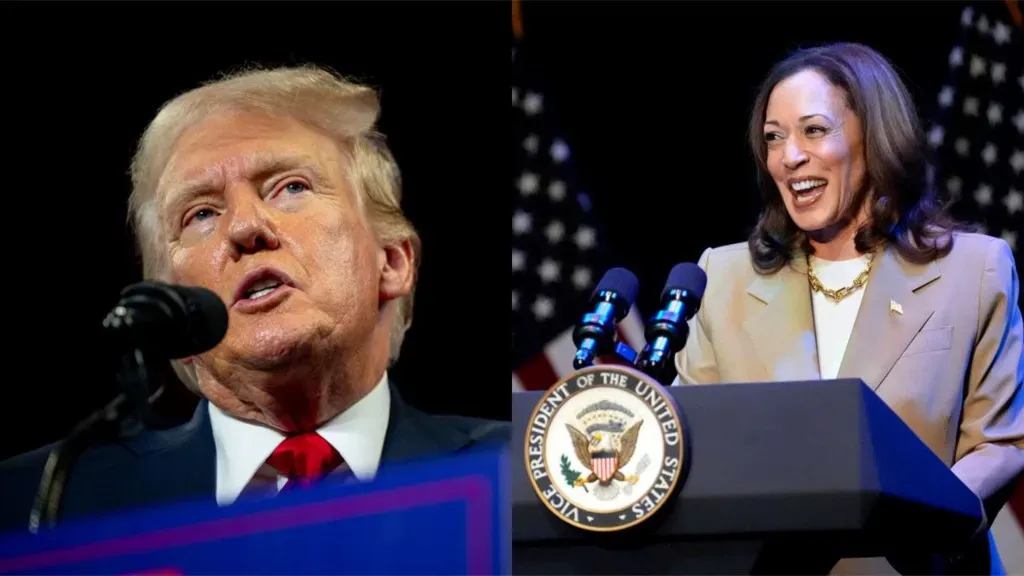Introduction
As the United States approaches the 2024 presidential election, a notable clash is brewing between leading candidates Donald Trump and Kamala Harris. The two candidates, who will face off in the race for the presidency on November 5, 2024, are currently at odds over the scheduling and broadcasting of their first debate. The disagreement highlights the tensions and strategic maneuvering that often accompany high-stakes electoral battles.
The Debate Dispute: Background and Context
The dispute between Trump and Harris over their inaugural debate reflects the broader context of an evolving political landscape. The debate was initially slated to be a significant event featuring President Joe Biden and Donald Trump. However, with Biden’s recent withdrawal from the race on July 21, 2024, Kamala Harris has emerged as the presumptive Democratic nominee. This unexpected shift has prompted a reevaluation of the debate arrangements.
Harris Campaign’s Proposal
The Harris campaign has proposed holding the debate on September 10, 2024, broadcasting it on ABC News. This date and network choice is significant, as it was originally designated for a debate between Biden and Trump. Harris’s team argues that maintaining the original schedule is crucial for ensuring a fair and timely discussion of key issues, emphasizing the importance of sticking to pre-established plans.
Trump’s Counterproposal
In response, Donald Trump has pushed for a different debate arrangement. Trump asserts that the debate on ABC News is no longer viable following Biden’s withdrawal. Instead, he has proposed a debate with Kamala Harris to be held on September 4, 2024, on Fox News. This proposal includes a debate to take place in Pennsylvania, a crucial battleground state that could play a pivotal role in the election outcome.
Trump’s proposal has stirred controversy, particularly with his choice of network and timing. Fox News, a network known for its favorable coverage of Trump, is seen as a strategic choice that might offer a more favorable environment for the former president. Trump has indicated that if Harris is unwilling or unable to participate on the proposed date, he is prepared to hold a major Town Hall event instead.
Reactions from the Campaigns
The disagreement has led to sharp exchanges between the two campaigns. Michael Tyler, the communications director for the Harris campaign, accused Trump of evading a debate he had previously agreed to. Tyler’s statement reflects the Harris campaign’s frustration with Trump’s shifting stance and their insistence on adhering to the original debate schedule.
Kamala Harris herself weighed in on the debate dispute through social media, criticizing Trump’s maneuvering as an attempt to avoid a direct confrontation. Harris emphasized her commitment to the debate on September 10, challenging Trump to honor the previously agreed-upon terms.
The Broader Impact of the Debate Dispute
The debate disagreement is not just about scheduling; it reflects deeper strategic and symbolic considerations. Debates are pivotal in shaping public perception and influencing voter opinions. The timing and choice of broadcast network can significantly impact the tone and reach of the debate.
For Trump, the September 4 debate on Fox News represents an opportunity to frame the discussion on his terms. The choice of a battleground state like Pennsylvania and a network with a substantial conservative audience could potentially boost his visibility and support.
For Harris, maintaining the September 10 debate on ABC News is about ensuring consistency and fairness. It underscores her campaign’s focus on adhering to established protocols and presenting herself as a candidate ready to engage in a national dialogue.
Additional Context: The Secret Service Report and Security Concerns
The debate dispute comes amid other significant political developments. A recent report by the Homeland Security Department has revealed mistakes made by the US Secret Service in their response to the January 6 attack on the US Capitol. This report underscores ongoing concerns about security and preparedness, issues that have inevitably influenced the political climate leading up to the 2024 election.
Kamala Harris, who was vice-president-elect at the time of the Capitol attack, narrowly avoided proximity to a bomb placed near the Democratic National Committee headquarters. The revelation of these security lapses adds another layer of urgency and complexity to the current political discourse.
Conclusion
The debate over the scheduling and broadcasting of the first presidential debate between Donald Trump and Kamala Harris highlights the intense and often contentious nature of electoral politics. As the election approaches, the candidates’ strategic decisions and public statements will continue to shape the political landscape. The outcome of this debate dispute could have far-reaching implications for both the candidates and the broader electoral process.
For comprehensive updates and insights into the developments surrounding the presidential debate and other election-related news, please refer to the original source.
Explore More
For detailed coverage and analysis of political events and updates in the US and Canada, visit our US & Canada section.


